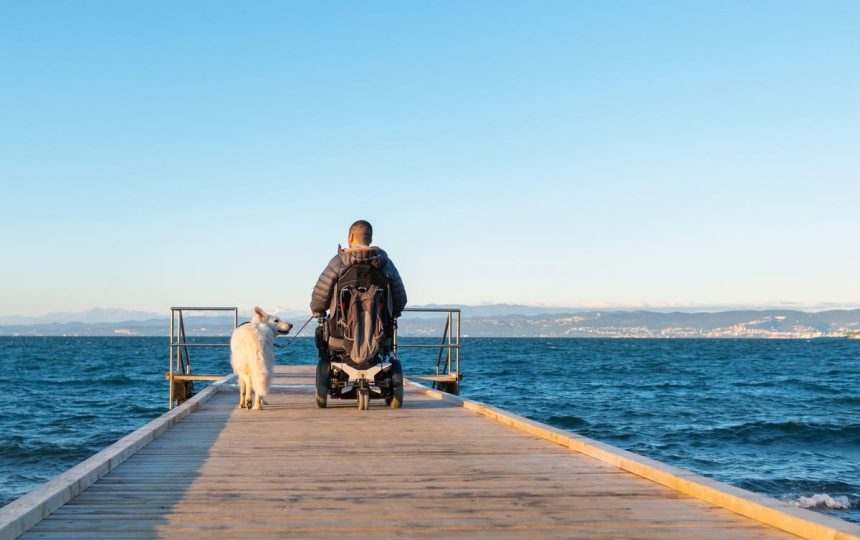Spinal cord injuries from trauma, disease or degenerative disorders newly affect roughly 17,700 people in the U.S. each year, according to United Spinal Association, a national organization dedicated to advocacy, empowerment and independence for people with spinal cord injuries or disorders. Of those, approximately 78% are men with an average age of 43. Vehicle accidents and falls are the most common causes of injuries at 39% and 32%, respectively.
Depending on where they impact the spine, spinal cord injuries can cause major motor impairments, including quadriplegia or paraplegia, as well as loss of organ function. United Spinal Association explains that injuries to the upper cervical region can cause loss of respiratory, arm, leg, bowel, bladder and sexual function. Those with injuries to the thoracic and lower regions (lumbar and sacral) may still be able to use their arms and hands.
September Is National Spinal Cord Injury Awareness Month
Major life changes from spinal cord injuries can include learning daily functions again and experiencing chronic pain, depression and anxiety. Through its programs and offerings, United Spinal Association helps people come to terms with their injuries. In addition, it also shows support by bringing people together every September for National Spinal Cord Injury Awareness Month, helping educate the public on the struggles people with spinal cord injuries face, while also helping raise funds for the cause.
During my career, I have worked with individuals with severe spinal cord injuries who are wheelchair users. Often, they must stop working and seek the Social Security Disability Insurance (SSDI) benefits they earned while employed. Many of these individuals eventually return to work through Social Security’s Ticket to Work Program.
Transitioning back to work can require courage and perseverance when dealing with spinal cord injuries. Whether requesting special accommodations or accepting limitations, the road can be challenging. Fortunately, employers are attempting to create and sustain environments that are inclusive of everyone’s situation.
United Spinal Association Helps Ease the Journey Back to Work
As an advocacy organization for people with spinal cord injuries or disorders (SCI/D) and wheelchair users, United Spinal provides many programs and resources to help members regain their independence and navigate the road back to work, when possible. Its Peer Support Program connects peer mentors with those who have similar experiences of SCI/D to offer guidance, support, friendship and someone to count on while they navigate life post trauma.
José Hernandez, president of United Spinal’s New York City chapter and peer mentor, explains, “Peer mentorship has played a major role in my life, both as a recipient and as a peer mentor. When I first became disabled at age 15, I wished I had access to others with disabilities like mine. Someone to give me words of advice and guidance that one needs in those critical moments where we are most vulnerable and lost.”
He adds, “Some of the most important people in my life are my peer mentors — and now friends who helped me through this journey. I have always wanted to give back and being a peer mentor has given me the ability to do that. I have been able to mentor those who have had disabilities their entire lives or someone who has been disabled for a short period of time, giving them encouragement to do whatever they feel they could at that current moment.”
Another United Spinal Association resource designed to help people with these traumatic disabilities return to work is the Pathways to Employment (PTE) Program. Through virtual or in-person events, United Spinal members and their advocates can learn how to identify the right jobs, transition back to work, overcome obstacles they might encounter and ask for accommodations in the workplace. This program also helps employers improve recruiting and onboarding people with disabilities.
“Employers can do more to make the work environment inclusive for people with spinal cord injuries by welcoming them to the organization. Supporting inclusivity in the workplace helps change the way business and employees think about disabilities in general,” Hernandez, a frequent PTE panelist, says.
“It is also important for companies to make those reasonable accommodations so the individual can have the tools needed to succeed. For example, in my situation as a C-5 quadriplegic with limited movement in my arms and none in my fingers, United Spinal provided an accessible workstation for me, as well as a headset microphone and trackball mouse so I could be successful in my job.”
People with Spinal Cord Injuries Do Return to Work
A difficult decision for anyone with a disability and particularly those with spinal cord injuries is what happens next. Questions can include: Can I pursue an education with my health requirements and limitations? Am I able to work? Will my employer be accommodating?
Hernandez had these same questions on his journey. However, with the help of a vocational therapist and assistive technology devices such as Dragon NaturallySpeaking, he was able to get a college degree. However, he was concerned about working and keeping his benefits. “At the time, there was a misconception that because of our disabilities, we would not be able to successfully return to work and retain our medical coverage and home care services. I soon learned while I was researching SSI/SSDI, that I could go back to work, earn money and maintain my medical benefits and home care support.”
Hernandez acknowledges that through his work with United Spinal, the support of peer mentors and his willingness to take chances and face his fears, he has been able to have a fulfilling life and career. “People believed in me when I did not believe in myself. Going back to work can be scary, but those fears can be overcome with the right resources and people on your side.”
Despite the profound challenges posed by living with SCI/D in American society, the unwavering support of organizations like United Spinal Association and forward-thinking employers are vital to employment efforts. When combined with personal motivation and courage, these individuals can not only reclaim their professional lives, but also redefine the boundaries of what’s possible.
Read the full article here









